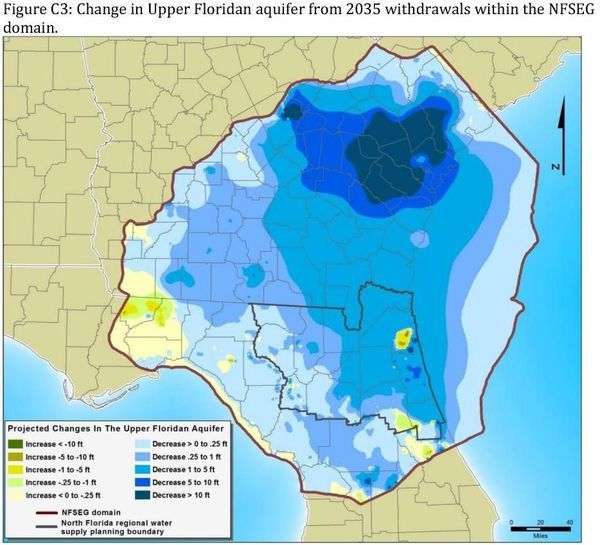Why can’t the JEA Buckman Wastewater Treatment Plant send its outflow into the St. Johns River, many people have asked?
Well, it does now.
But according to Florida Senate Bill 64 of 2021, JEA has to stop doing that less than 11 years from now, in 2032.
Wait, isn’t that about the goal for operation of the Water First North Florida (WFNF) pipeline for JEA Buckman outflow into wetlands in the Suwannee River Basin?
See below.
![[FL SB 64: Reclaimed Water, nonbeneficial surface water discharge, JEA Buckman Wastewater Plant, and WFNF 2025-2032]](https://www.wwals.net/pictures/2021-06-29--fl-sb-64/fbmany.jpg)
FL SB 64: Reclaimed Water, nonbeneficial surface water discharge, JEA Buckman Wastewater Plant, and WFNF 2025-2032
Here’s the purpose of SB 64:
403.064 Reuse of reclaimed water.
(17) By November 1, 2021, domestic wastewater utilities that dispose of effluent, reclaimed water, or reuse water by surface water discharge shall submit to the department for review and approval a plan for eliminating nonbeneficial surface water discharge by January 1, 2032, subject to the requirements of this section.
We have found that the JEA Buckman plant is nowhere near meeting potable reuse standards, what with an FDEP Consent Order on it right now for exceeding numerous outflow limits.
Fortunately for JEA, SB 64 provides at least two loopholes JEA could use. Continue reading

![[Consent Order on JEA Buckman Wastewater Treatment Plant --FDEP 2025-09-15]](https://www.wwals.net/pictures/2025-09-15--fdep-consent-order-jea/fbmany.jpg)
![[JEA approved $400 million for treated wastewater 2025-11-18 into Suwannee Basin, Water First North Florida]](https://www.wwals.net/pictures/2025-11-19--jea-wfnf/fbmany.jpg)
![[SJRWMD hired a consultant to plan piping treated Jacksonville wastewater into the Suwannee River Basin (Water First North Florida) 2025-11-12]](https://www.wwals.net/pictures/2025-11-12--water-first-north-florida-consultants-sjrwmd/fbmany.jpg)
![[Why is piping treated JAX wastewater into the Suwannee River Basin, better than limiting water withdrawals? Ask FL statehouse and WMD boards]](https://www.wwals.net/pictures/2026-01-02--ask-about-wfnf/fbmany.jpg)
![[SRWMD & SJRWMD aquifer recharge project update @ SRWMD 2025-07-08, What about PFAS? and limits on water withdrawals?]](https://www.wwals.net/pictures/2025-07-08--srwmd-aquifer-recharge-project-update/fbmany.jpg)
![[2019-04-03 White Sulfur Spring Flowing]](https://www.wwals.net/pictures/2016-12-12--djprice-nfrwsp/2019-04-03--white-sulfur-spring-flowing.jpg)

![[Flyer]](https://www.wwals.net/pictures/2020-06-23--steve-nichols-radio-video/flyer.jpg)




![[Dennis Price explains, 13:50:12, 30.57871, -83.05231]](https://www.wwals.net/pictures/2018-01-27--hike-dead-river-sink/20180127_135013.jpg)